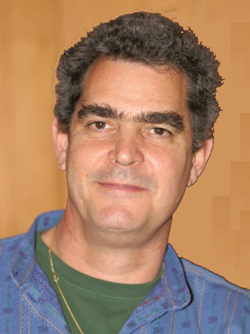
SPEAKER PROFILE |
 Prof. Martin Hegner University of Dublin, Trinity College Dublin, School of Physics IRELAND |
Nanomechanical sensors for single microbial cell growth monitoring
Abstract
Gyöngyi Lukacs, Niall Maloney, Warren Fon, Michael Roukes, Martin Hegner
A nanomechanical technique for rapid real time detection and monitoring of microfungus growth will significantly reduce costs and diagnosis times in industrial and clinical settings. Owing to their label free detection mechanism and unprecedented sensitivity to the mass and elastic modulus of biological structures, dynamically operated cantilever arrays provide an opportunity to rapidly detect and track the evolution of microbial growth in humid air conditions. Here we report the monitoring of the growth of single Aspergillus niger spores via the multimode response of microcantilevers. The fungal hyphal structure affects the cantilevers' nanomechanical properties as it propagates along the sensor. We will show that inertial mapping of cantilever mechanics allows to describe cellular events with great accuracy using the cantilever array frequency responses. Imaging of growth conditions on the cantilever, which is performed in parallel, allow for verification of these results. Theoretical comparison and finite element modelling confirm experimental findings and allow for determination of the hyphal elastic modulus. Integrated MEMS enable a compact desgin of the analytical device since the laser source and position sensitive detection can be eliminated. We will discuss pro and contra of the two approaches.
Hegner’s scientific interests are focused on interdisciplinary research in the fields of single molecule manipulation, biophysics, bio-diagnostics and development and application of biological sensing devices.
A nanomechanical technique for rapid real time detection and monitoring of microfungus growth will significantly reduce costs and diagnosis times in industrial and clinical settings. Owing to their label free detection mechanism and unprecedented sensitivity to the mass and elastic modulus of biological structures, dynamically operated cantilever arrays provide an opportunity to rapidly detect and track the evolution of microbial growth in humid air conditions. Here we report the monitoring of the growth of single Aspergillus niger spores via the multimode response of microcantilevers. The fungal hyphal structure affects the cantilevers' nanomechanical properties as it propagates along the sensor. We will show that inertial mapping of cantilever mechanics allows to describe cellular events with great accuracy using the cantilever array frequency responses. Imaging of growth conditions on the cantilever, which is performed in parallel, allow for verification of these results. Theoretical comparison and finite element modelling confirm experimental findings and allow for determination of the hyphal elastic modulus. Integrated MEMS enable a compact desgin of the analytical device since the laser source and position sensitive detection can be eliminated. We will discuss pro and contra of the two approaches.
Bio
Life sciences at the ETH Zürich. Diplom degree in biochemistry and molecular biology in 1989. PhD thesis 1994 in the field of protein translocation across membranes and biological scanning probe microscopy at the ETH Zürich, Institute for Biochemistry. In 1994-96 post-graduate position at the Institute of Physics in Basel in the laboratory of the late H.-J. Güntherodt, a pioneer in the field of scanning probe microscopy. 1996-99 research associate in the group of C. Bustamante at the Howard Hughes Medical Institute in Eugene OR and then at University of California at Berkeley, CA (single molecule manipulation with optical tweezers). In 1999 he joined the Institute of Physics at University of Basel (Switzerland) as project leader for biological nanoscale science within the newly founded Swiss NCCR ‘Nanoscale Science’. Until today he introduced several novel approaches to investigate molecular interactions with nanomechanical tools. In 2001 he received his ‘venia docendi’ in experimental physics at the University of Basel, Switzerland and in 2007 he joined the Physics faculty of the University of Dublin, Trinity College Dublin Ireland. He was appointed as professor of the School of Physics and pursues his interdisciplinary research in the Centre of Research on Adaptive Nanostructures and Nanodevices (CRANN). In 2008 he was awarded the Stokes Professor by the Irish Science Foundation.Hegner’s scientific interests are focused on interdisciplinary research in the fields of single molecule manipulation, biophysics, bio-diagnostics and development and application of biological sensing devices.